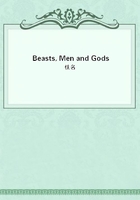
第76章 IN THE CITY OF LIVING GODS, OF 30,000 BUDDHAS AND
To the lively colored groups of men buying, selling and shouting their wares, the bright streamers of Chinese cloth, the strings of pearls, the earrings and bracelets gave an air of endless festivity; while on another side buyers were feeling of live sheep to see whether they were fat or not, the butcher was cutting great pieces of mutton from the hanging carcasses and everywhere these sons of the plain were joking and jesting. The Mongolian women in their huge coiffures and heavy silver caps like saucers on their heads were admiring the variegated silk ribbons and long chains of coral beads; an imposing big Mongol attentively examined a small herd of splendid horses and bargained with the Mongol zahachine or owner of the horses; a skinny, quick, black Tibetan, who had come to Urga to pray to the Living Buddha or, maybe, with a secret message from the other "God" in Lhasa, squatted and bargained for an image of the Lotus Buddha carved in agate; in another corner a big crowd of Mongols and Buriats had collected and surrounded a Chinese merchant selling finely painted snuff-bottles of glass, crystal, porcelain, amethyst, jade, agate and nephrite, for one of which made of a greenish milky nephrite with regular brown veins running through it and carved with a dragon winding itself around a bevy of young damsels the merchant was demanding of his Mongol inquirers ten young oxen; and everywhere Buriats in their long red coats and small red caps embroidered with gold helped the Tartars in black overcoats and black velvet caps on the back of their heads to weave the pattern of this Oriental human tapestry. Lamas formed the common background for it all, as they wandered about in their yellow and red robes, with capes picturesquely thrown over their shoulders and caps of many forms, some like yellow mushrooms, others like the red Phrygian bonnets or old Greek helmets in red.
They mingled with the crowd, chatting serenely and counting their rosaries, telling fortunes for those who would hear but chiefly searching out the rich Mongols whom they could cure or exploit by fortune telling, predictions or other mysteries of a city of 60,000Lamas. Simultaneously religious and political espionage was being carried out. Just at this time many Mongols were arriving from Inner Mongolia and they were continuously surrounded by an invisible but numerous network of watching Lamas. Over the buildings around floated the Russian, Chinese and Mongolian national flags with a single one of the Stars and Stripes above a small shop in the market; while over the nearby tents and yurtas streamed the ribbons, the squares, the circles and triangles of the princes and private persons afflicted or dying from smallpox and leprosy. All were mingled and mixed in one bright mass strongly lighted by the sun. Occasionally one saw the soldiers of Baron Ungern rushing about in long blue coats; Mongols and Tibetans in red coats with yellow epaulets bearing the swastika of Jenghiz Khan and the initials of the Living Buddha; and Chinese soldiers from their detachment in the Mongolian army. After the defeat of the Chinese army two thousand of these braves petitioned the Living Buddha to enlist them in his legions, swearing fealty and faith to him. They were accepted and formed into two regiments bearing the old Chinese silver dragons on their caps and shoulders.
As we crossed this market, from around a corner came a big motor car with the roar of a siren. There was Baron Ungern in the yellow silk Mongolian coat with a blue girdle. He was going very fast but recognized me at once, stopping and getting out to invite me to go with him to his yurta. The Baron lived in a small, simply arranged yurta, set up in the courtyard of a Chinese hong. He had his headquarters in two other yurtas nearby, while his servants occupied one of the Chinese fang-tzu. When I reminded him of his promise to help me to reach the open ports, the General looked at me with his bright eyes and spoke in French:
"My work here is coming to an end. In nine days I shall begin the war with the Bolsheviki and shall go into the Transbaikal. I beg that you will spend this time here. For many years I have lived without civilized society. I am alone with my thoughts and I would like to have you know them, speaking with me not as the 'bloody mad Baron,' as my enemies call me, nor as the 'severe grandfather,'
which my officers and soldiers call me, but as an ordinary man who has sought much and has suffered even more."The Baron reflected for some minutes and then continued:
"I have thought about the further trip of your group and I shall arrange everything for you, but I ask you to remain here these nine days."What was I to do? I agreed. The Baron shook my hand warmly and ordered tea.